Related Research Articles
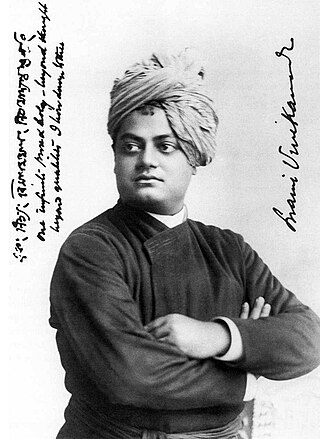
Swami Vivekananda, born Narendranath Datta, was an Indian Hindu monk, philosopher, author, religious teacher, and the chief disciple of the Indian mystic Ramakrishna. He was a key figure in the introduction of Vedanta and Yoga to the Western world; and is credited with raising interfaith awareness, and bringing Hinduism to the status of a major world religion. Vivekananda became a popular figure after the 1893 Parliament of Religions in Chicago, where he began his famous speech with the words, "Sisters and brothers of America...," before introducing Hinduism to Americans. He was so impactful at the Parliament that an American newspaper described him as: “an orator by divine right and undoubtedly the greatest figure at the Parliament”. After great success at the Parliament, in the subsequent years, Vivekananda delivered hundreds of lectures across the United States, England and Europe, disseminating the core tenets of Hindu philosophy, and founded the Vedanta Society of New York and the Vedanta Society of San Francisco, both of which became the foundations for Vedanta Societies in the West.

Ramakrishna Paramahansa, also spelled Ramakrishna Paramahamsa, born Gadadhar Chattopadhyaya, was an Indian Hindu mystic and spiritual leader. After adhering to various religious practices from the Hindu traditions of Bhakti yoga, Tantra, and Advaita Vedanta as well as from Islam and Christianity, he proclaimed the world's various religions as "so many paths to reach one and the same goal", thus validating the essential unity of religions. Ramakrishna's followers came to regard him as an avatar, or divine incarnation, as did some of the prominent Hindu scholars of his day.

Ramakrishna Mission (RKM) is a Hindu religious and spiritual organisation which forms the core of a worldwide spiritual movement known as the Ramakrishna Movement or the Vedanta Movement. The mission is named after an Indian spiritual Guru Ramakrishna Paramahamsa and founded by Ramakrishna's chief disciple Swami Vivekananda on 1 May 1897. The organisation mainly propagates the Hindu philosophy of Vedanta–Advaita Vedanta and four yogic ideals – Jnana, Bhakti, Karma, and Raja yoga.
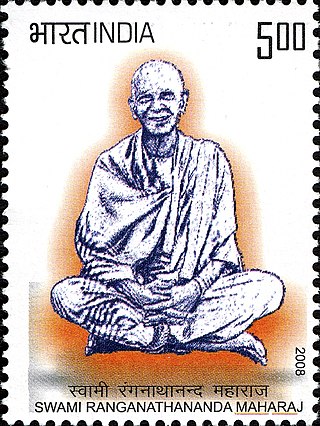
Swami Ranganathananda was a Hindu swami of the Ramakrishna Math order. He served as the 13th president of the Ramakrishna Math and Mission.
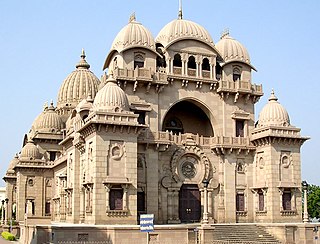
Ramakrishna Math is the administrative legal organization of the Ramakrishna Order, considered part of the Hindu reform movements. It was set up by sanyasin disciples of Ramakrishna Paramhansa headed by Swami Vivekananda at Baranagar Math in Baranagar, a place near Calcutta, in 1886. India. The headquarters of Ramakrishna Math and its twin organisation, Ramakrishna Mission is at Belur Math.

Shulim or Nikolai Aleksandrovich Notovich, known in the West as Nicolas Notovitch, was a Crimean Jewish adventurer who claimed to be a Russian aristocrat, spy and journalist.

Vedanta Societies refer to organizations, groups, or societies formed for the study, practice, and propagation of Vedanta, the ultimate aim of Vedas. More specifically, they "comprise the American arm of the Indian Ramakrishna movement", and refer to branches of the Ramakrishna Order located outside India.
Swami Tyagananda is a Hindu monk of the Ramakrishna Order and presently the head of the Vedanta Society in Boston. Currently, he is also the Hindu chaplain at MIT and Harvard. He has presented papers at academic conferences, and he gives lectures and classes at the Vedanta Society, MIT, Harvard, and other colleges in and around Boston.
Ramakrishna (1836–1886) was a 19th-century Indian mystic whose teachings form the foundation of the Ramakrishna religious movement, Ramakrishna Order and Ramakrishna Mission.
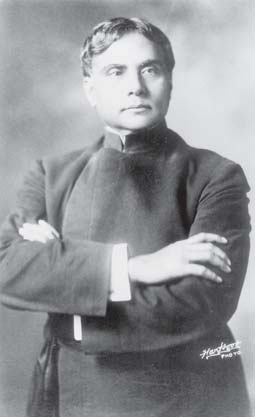
Swami Abhedananda, born Kaliprasad Chandra, was a direct disciple of the 19th century mystic Ramakrishna Paramahansa and the founder of Ramakrishna Vedanta Math. Swami Vivekananda sent him to the West to head the Vedanta Society of New York in 1897, and spread the message of Vedanta, a theme on which he authored several books through his life, and subsequently founded the Ramakrishna Vedanta Math, in Calcutta and Darjeeling.
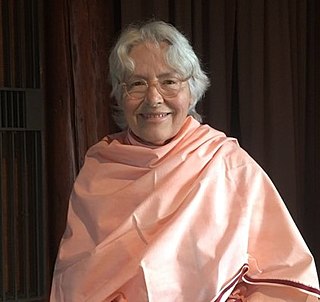
Pravrajika Vrajaprana is a sannyasini or pravrajika at the Vedanta Society of Southern California, affiliated with the Ramakrishna Order. She resides at Sarada Convent in Santa Barbara, CA. and a writer on Vedanta, the history and growth of the Vedanta Societies

Swami Vivekananda was a Hindu monk from India. His teachings and philosophy are a reinterpretation and synthesis of various strands of Hindu thought, most notably classical yoga and (Advaita) Vedanta, with western esotericism and Universalism. He blended religion with nationalism, and applied this reinterpretation to various aspect's of education, faith, character building as well as social issues pertaining to India. His influence extended also to the west, and he was instrumental in introducing Yoga to the west.

Josephine MacLeod was an American friend and devotee of Swami Vivekananda. She had a strong attachment to India and was an active participant in the Ramakrishna Vivekananda movement. She was given the nicknames "Tantine" and "Jo Jo" by Vivekananda. She considered Swami Vivekananda to be her friend and helped him with his finances. MacLeod was not a sanyasin, unlike many others such as Sister Nivedita or Sister Christine. She was instrumental in spreading Vivekananda's message on Vedanta in the West. She made many contributions to the initial and the later phases of the development of the order of Ramakrishna and Vivekananda. She was a contributor to many causes espoused by Sister Nivedita, the most famous disciple of Vivekananda, including that of contributing financially towards the development of the Indian National Movement especially in Bengal and elsewhere in India.

Swami Vivekananda, the 19th-century Indian monk, came to Los Angeles, California in 1899 during his second visit to the West. His oratorical skills and presentation of Hindu religious tenets and comparison with other religious beliefs made him a celebrity among a wide spectrum of American audience. Between 1893—1897 and 1899–1902, he traveled widely in the US lecturing on a wide range of subjects and also established Vedanta Centers. There are such centers in many cities in the US, including many centers in California. In 1899, after delivering lectures in New York, he travelled to the western part of the United States and reached Los Angeles via Chicago. He then went on to deliver lectures in California at Oakland, San Francisco and Alameda.
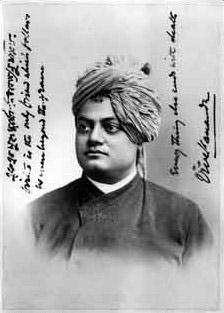
"Buddhism, the Fulfilment of Hinduism" is a lecture delivered by Indian Hindu monk and expounder Swami Vivekananda on 26 September 1893 at the Parliament of the World's Religions in Chicago. In this lecture, he expressed his opinion that "Buddhism was the fulfilment of Hinduism."
Christ, the Messenger was a lecture delivered by Swami Vivekananda in Los Angeles, California in January 1900. In the same year, the lecture was published as a book by The Vedanta Centre, Boston. In his lecture, Vivekananda attempted to analyze the life and messages of Jesus through Vedanta.
Swami Vidyatmananda was born John Yale. He studied under Swami Prabhavananda at the Vedanta Society of Southern California and was ordained as a monk of the Ramakrishna Mission in 1964. He traveled to India and recorded his impressions in the book, A Yankee and the Swamis: A Westerner's View of the Ramakrishna Order. He also edited the journal Vedanta and the West and compiled a selection of the teachings of Swami Vivekananda in What Religion Is: In the Words of Swami Vivekananda which contains an introduction by Christopher Isherwood. He was an assistant to Swami Ritajananda at the Centre védantique Ramakrishna in Gretz, France, where he served as the center's manager until his death on March 22, 2000, at the age of 86. He edited the magazine Vedanta and the West and corresponded with many Western intellectuals including Aldous Huxley, Christopher Isherwood, Walter de la Mare, E. M. Forster, and Gerald Heard. His autobiography The Making of a Devotee reveals his spiritual evolution.
Swami Satprakashananda was an Indian philosopher, monk of the Ramakrishna Order, and religious teacher.
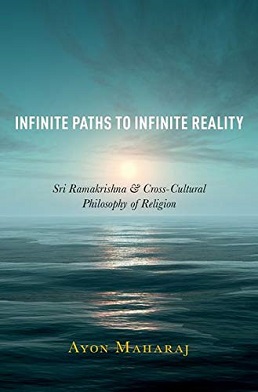
Infinite Paths to Infinite Reality: Sri Ramakrishna & Cross-Cultural Philosophy of Religion is a book by Ayon Maharaj on Sri Ramakrishna and the philosophy of religion. The book was published in the US and UK in 2018 in hardcover. An Indian hardcover edition was published in 2019. The book has been reviewed in professional and popular journals, and in 2021 was the focus of a fourteen-article book symposium in the International Journal of Hindu Studies.

Swami Sarvapriyananda is a Hindu monk (sannyasi) belonging to the Ramakrishna Order. He is the current resident Swami and head of the Vedanta Society of New York, a position he has been serving since January 2017.
References
- ↑ Elva Nelson, A Monk for All Seasons, Llumina Press, 2007
- ↑ "Akhilananda". Vedanta Society. Retrieved 30 April 2022.
- ↑ See p. 44 of Elva Nelson, A Monk for All Seasons.
- ↑ Swami Akhilananda, Hindu Psychology, Its Meaning for the West, Routledge, New York, 1948.
- ↑ S. Hiltner, Review of Mental Health and Hindu Psychology, The Journal of Religion, Vol. 33, No. 1 (Jan., 1953), p. 78. found at: https://www.jstor.org/stable/pdf/1199752.pdf
- ↑ Jongeneel, Jan A. B. (2009). Jesus Christ in World History: His Presence and Representation in Cyclical and Linear Settings. Peter Lang. ISBN 978-3-653-00238-6.
- ↑ https://archive.org/details/spiritualpractic0000akhi_w1f8 (p. 15)
- ↑ See p. 233 of Elva Nelson, A Monk for All Seasons.